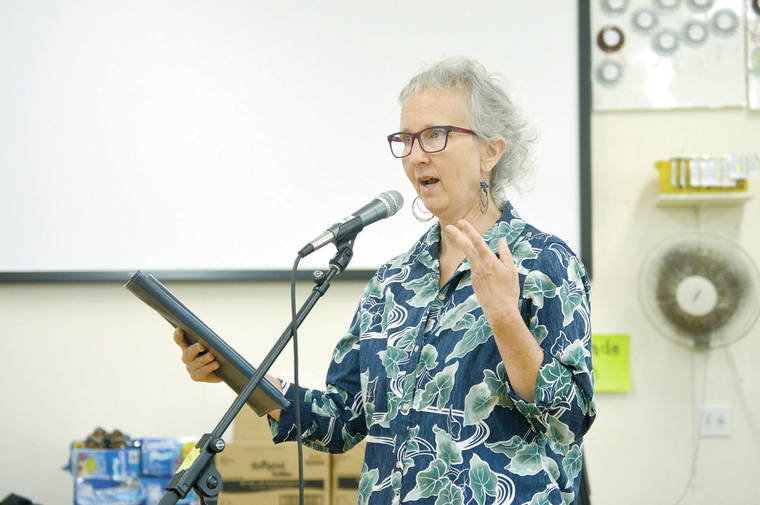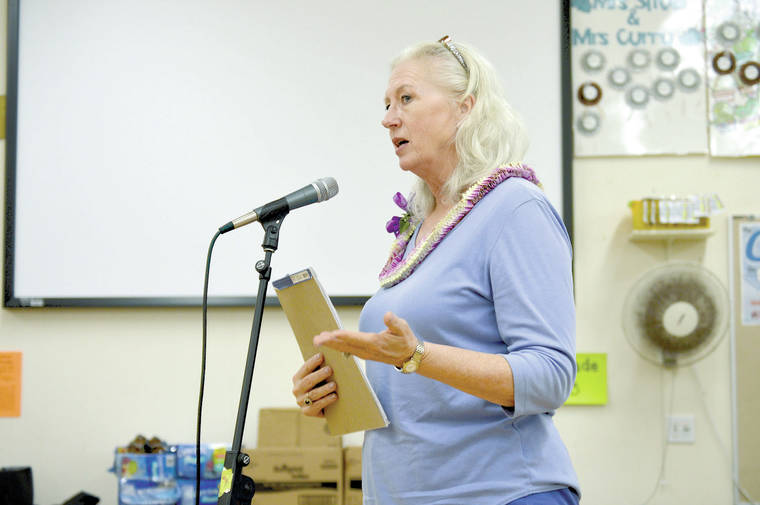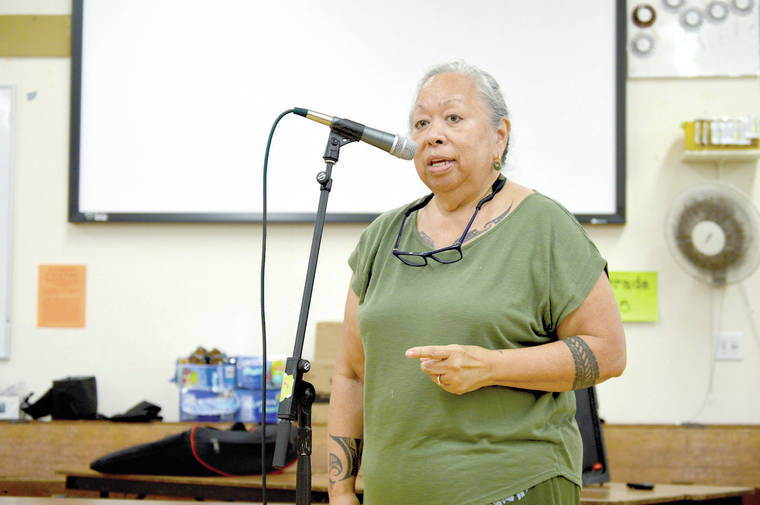Foes blast Maunakea rules
More than 100 people showed up Tuesday evening at Waiakea Elementary School for a public hearing on a revised draft of administrative rules regulating public and commercial activities on Maunakea.
Of the 31 individuals who testified, 30 expressed opposition to the proposal, which allows the University of Hawaii to govern public and commercial activities on UH-managed lands on the mountain. UH leases 11,228 acres of the mountain that are part of the Maunakea Science Reserve.
ADVERTISING
The rules, if adopted, would give the university, through the Office of Mauna Kea Management, the authority to levy fines of $50 to $10,000 for violations.
University officials have said the proposed rules are unrelated to the controversy surrounding the proposed construction of the Thirty Meter Telescope on the mountain, which many Hawaiians and others consider sacred, but some at Tuesday’s hearing said they think the rules will be used against those who go to the mountain to protest, should construction on the long-stalled $1.4 billion observatory begin.
Alapaki Nahale-a, appointed in January to represent Hawaii County on the UH Board of Regents, conducted the hearing. Some who testified hugged the Hilo native and told him their testimony wasn’t intended for him, personally.
Several testifiers questioned why UH President David Lassner wasn’t in attendance.
Dr. Noe Noe Wong-Wilson, an academic, Hawaiian cultural practitioner and executive director of the nonprofit Lalakea Foundation, said for Native Hawaiians and others who adopted Hawaii Island as their home, their sense of well-being “is very much related to the ‘aina (land) and the welfare of the ‘aina.”
“The development of telescopes on Maunakea is an intrusion into that sense of well-being, and it affects us in ways that are immeasurable,” Wong-Wilson said. “… When I read the current set of rules, all I could see was that I have been breaking every single proposed rule that exists there.”
“… When I read the rules, all I see is a threat to myself, personally, as well as to my friends and fellow practitioners,” she continued. “And the threat is arrest and monetary damage, from the $250 fine to the $10,000 fine, depending on how often we go to our church to practice our religion. … I think, first of all, the university has no business being in that place to manage the mauna. I know it’s been said over and over again, but it’s like the fox watching the chicken house.”
Ronald Fujiyoshi, an activist and retired pastor of Ola‘a First Hawaiian Church, was sentenced to six months probation for restricting Thirty Meter Telescope construction workers’ access to Mauna Kea Access Road in 2015. He testified UH “must abide by a separation of church and state.”
“In other words, the state cannot dictate religion to anyone who claims to hold religious and spiritual beliefs unless it is restricting the fundamental human rights of others,” Fujiyoshi said. “The rules that are being proposed overstep the rights of anyone that believes Maunakea to be a sacred mountain.”
Ruth Aloua of Kona, who also was arrested on Maunakea in 2015 — her case was later dismissed — called the proposed rules “an act of war on the very existence of kanaka maoli.”
“We’ve been criminalized,” Aloua said. “It’s happened, and it’s happening. OK, so we’re at an act of war. So what are the admin rules now? We’re talking about rules of engagement. I’m a front liner. You like learn about aloha … come, come to the front lines. Let’s talk about aloha over there. Let’s talk about aloha when they put our families on hold, when we’re quitting jobs, when we’re getting blacklisted, ’cause we cannot get hired again. Let’s talk about that kind of aloha. Please, tell me how for navigate those waters of aloha. ’Cause that’s the waters that I stay in. I get aloha for you, but I’m telling you, come to the front lines … to the mauna. ’Cause that’s where I will be standing. And I will not be standing alone.”
Realtor Mary Begier was the only speaker in support of the proposed rules. Begier, who recently received a State of Hawaii Small Business Advocacy Award for Business and Industry, said the Hawaii Island Chamber of Commerce “will continue to watch what the university system is doing because it’s the largest employer on our island, and it’s super important to East Hawaii, not only for financial reasons but for educational reasons.”
“The idea that this version of rules is only meant to address construction of a specific building project, may seem as such, but I look at it really differently,” Begier said. “We said there were things wrong with the behavior when there was discussion of starting construction a few years ago. And I just see it as the rules are addressing what we all said was wrong. And so I’d like to see us work harder on what’s been provided to us, and maybe some more focus on the cultural practitioner position in all of this. And I believe we all have the same love and aloha for our island and our mountain, and that we can do this together.”
Tom Peek, an author from Volcano, described himself as “long ago an astronomy guide for the observatories and an eyewitness to 30 years of UH and (Department of Land and Natural Resources) malfeasance … driven by a combination of ethnocentric prejudice and unrelenting pressure from Hawaii’s construction and tourism industries.” He challenged “the legitimacy of these rules” and OMKM, which he described as “an entity (UH) could control.”
“OMKM was never intended to restore balance on the mountain, but instead to use sham planning and carefully contrived cultural consultation as political cover for building more telescopes and to begin limiting noncommercial access to the summit.” Peek said. “If enacted, the rules will almost certainly end up in court — as they should. And you regents will be tainted — as you should.”
Artist Catherine Robbins, also from Volcano and a hiker, called the proposal “a new set of rules to regulate islanders’ access, some of which would actually make criminals of Native Hawaiians and residents like me, just for being on the mountain in some way UH deems inappropriate.”
“A full fifth of the document … contains myriad provisions for how violators will be treated, not in a court of law, but by UH — eight pages of gruesome detail about the draconian penalties and fines, including making the cost of any contested case proceeding payable by the people. This is outrageous and wrong,” Robbins said.
“Maunakea isn’t owned by the university. Islanders have a right to be there.”
Tuesday’s hearing was part of a second round of hearings, with changes to the original round of proposals since a series of hearings held in September. Hearings also were held Monday in Honolulu and Wednesday in Waikoloa.
A final hearing is scheduled for Friday in Kahului, Maui.
Based on this round of formal public hearings, the rules might be again amended and submitted to the Board of Regents in a publicly noticed meeting currently anticipated for July 18.
Written testimony about the rules will be accepted until 11:59 p.m. Friday. The rules and a form to submit feedback are available online at http://hawaii.edu/govrel/uhhar-testimony/.
Email John Burnett at jburnett@hawaiitribune-herald.com.







